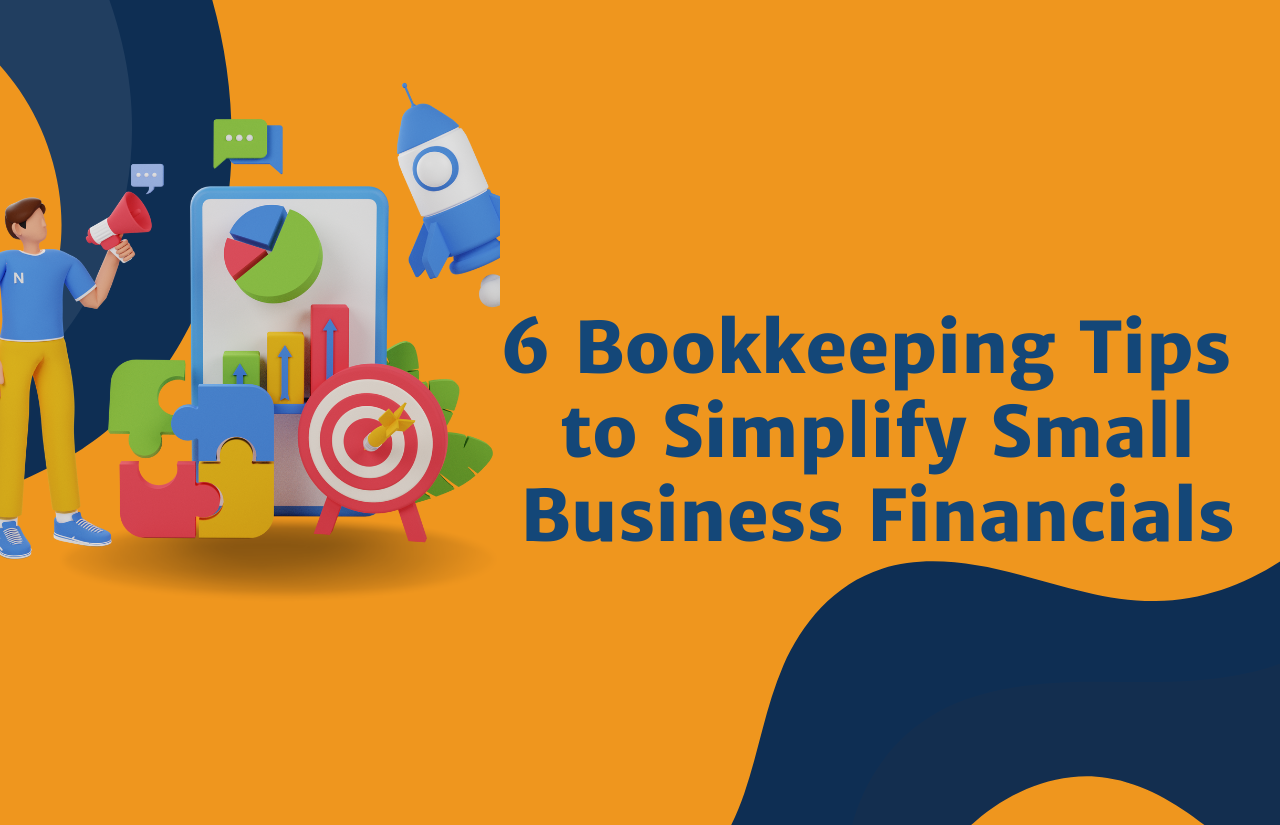Starting a new business is an exciting and daunting venture. As an entrepreneur, you have many tasks to juggle, and one of the most important is keeping your financial records in order.
Whether you are a tech startup or a small business, accounting and bookkeeping are essential for your success. In this guide, we will provide you with the information you need to manage your startup bookkeeping effectively.

We’ll discuss the difference between accounting and bookkeeping, explain the financial records you need to keep, and provide a bookkeeping checklist for startups.
Additionally, we’ll cover the best accounting software for startups and help you decide whether you should DIY or outsource your accounting and bookkeeping. By the end of this guide, you’ll have a better understanding of how to manage your startup’s finances, so let’s get started.
Accounting vs. bookkeeping for startups
When it comes to managing your startup’s finances, it’s essential to understand the difference between accounting and bookkeeping. Both of these terms are often used interchangeably, but they serve distinct purposes. In this section, we’ll break down the differences between accounting and bookkeeping and why both are crucial for your startup’s success.
First, let’s define bookkeeping. Bookkeeping is the process of recording and organizing financial transactions. This includes things like tracking expenses, sales, and receipts. The primary goal of bookkeeping is to create accurate financial records that can be used for accounting and tax purposes.
On the other hand, accounting involves analyzing, interpreting, and summarizing financial data to provide insights into your startup’s financial health. Accounting involves more complex financial tasks such as creating financial statements, conducting audits, and preparing tax returns.
To summarize, bookkeeping is the process of recording and organizing financial transactions, while accounting involves analyzing and interpreting financial data to make informed decisions.
Now that we understand the difference between accounting and bookkeeping let’s discuss why both are essential for startups. In the next section, we’ll dive deeper into the financial records that startups need to keep track of.
A guide to financial records for startups
Starting a new business venture can be both exciting and challenging. Amidst the chaos of setting up the company and getting things off the ground, it’s crucial not to overlook the importance of maintaining accurate financial records.
In this section, we’ll provide a comprehensive guide to financial records for startups, including what you need to track, how to track it, and why it matters.
What financial records should startups keep?
To start with, every startup should maintain the following financial records:
Income and sales records: This includes all the money that comes into your business, such as revenue from sales, services rendered, and interest earned.
Expense records: This includes all the money that goes out of your business, such as rent, salaries, office supplies, and other operating expenses.
Tax records: This includes all the necessary documents and records required for tax filings, such as receipts, invoices, bank statements, and payroll records.
Asset records: This includes any assets that your business owns, such as equipment, real estate, and vehicles.
Liability records: This includes any outstanding debts that your business owes, such as loans, credit card balances, and unpaid bills.
How to track financial records for startups?
Tracking financial records accurately is vital for startups as it can provide essential insights into business operations, performance, and potential for growth. Here are some steps to follow when tracking financial records for your startup:
Keep separate business and personal accounts: It’s essential to have separate bank accounts for your business and personal expenses. This will help you keep your finances organized and make it easier to track your business expenses.
Use accounting software: Accounting software such as QuickBooks can help you track income, expenses, and taxes efficiently. It can also generate financial reports, including balance sheets and income statements, which can help you make informed financial decisions.
Categorize your expenses: Categorizing expenses accurately can help you identify areas where you can save money. It can also help you with tax preparation and ensure that you claim all the deductions you’re entitled to.
Keep receipts and invoices: Keep all receipts and invoices organized in a centralized location, such as a cloud-based accounting software or a physical folder. This can help you keep track of expenses and make it easier to prepare for tax filings.

Why do financial records matter for startups?
Maintaining accurate financial records can provide many benefits for startups, including:
Helping you make informed financial decisions: By keeping track of financial records, you can gain insights into your business’s performance and identify areas where you can cut costs and improve revenue.
Simplifying tax filings: By keeping accurate records of income and expenses, you can make tax preparation and filings much easier.
Building trust with investors: Investors are more likely to invest in a company that has well-organized financial records, as it demonstrates transparency and a commitment to sound financial management.
Overall, keeping accurate financial records is critical for the success of your startup.
By following these best practices, you can keep track of your finances and make informed decisions that can help your business grow.
Bookkeeping checklist for startups
Keeping your financial records organized is essential for the success of your startup. Here’s a bookkeeping checklist to help you stay on track:
1. Set up a Chart of Accounts
A Chart of Accounts is a list of all the accounts in your accounting system. It helps you keep track of your expenses, revenue, assets, and liabilities. Make sure to categorize your accounts in a way that makes sense for your business.
2. Track Your Expenses
It’s important to keep track of your business expenses to make sure you’re not overspending. You can use a spreadsheet or accounting software like QuickBooks to track your expenses.
3. Keep Track of Your Invoices
Make sure to send invoices to your customers and keep track of them. This will help you keep track of your revenue and ensure that you get paid on time.
4. Reconcile Your Bank Accounts
Reconciling your bank accounts is the process of comparing your bank statement to your accounting records to make sure they match. This will help you identify any errors or fraudulent transactions.
5. Monitor Your Cash Flow
Cash flow is the amount of money coming in and going out of your business. It’s important to monitor your cash flow to ensure that you have enough money to pay your bills and invest in your business.
6. Prepare Financial Statements
Financial statements provide an overview of your business’s financial performance. The three main financial statements are the income statement, balance sheet, and cash flow statement. Make sure to prepare these statements regularly to track your progress.
Following this bookkeeping checklist will help you stay on top of your financial records and make informed business decisions.
But also you’ll be avoiding the most common bookkeeping mistakes.

Financial Statements for Startups
One of the most important aspects of bookkeeping and accounting for startups is the preparation of financial statements. These statements provide a clear picture of a company’s financial health and are crucial for making informed business decisions.
Here are the three most important financial statements that every startup should prepare and review regularly:
Income Statement
Also known as a profit and loss statement, the income statement summarizes a company’s revenue and expenses over a specific period of time. It shows the net profit or loss of the business during that period and helps owners and investors understand the company’s financial performance.
Balance Sheet
The balance sheet provides a snapshot of a company’s financial position at a specific point in time. It lists the company’s assets, liabilities, and equity, and helps owners and investors understand the company’s liquidity, solvency, and ability to generate cash.
Cash Flow Statement
The cash flow statement shows the inflow and outflow of cash from a company’s operations, investments, and financing activities over a specific period of time. It helps owners and investors understand how the company generates and uses cash and how it can meet its financial obligations.
It’s important to note that these financial statements should be prepared accurately and regularly. They should also be reviewed by a qualified accountant or bookkeeper to ensure their accuracy and completeness.
By having a clear understanding of their financial statements, startups can make informed decisions about their business and improve their chances of long-term success.
Let’s move on to the next section.
Best accounting software for startups
When it comes to managing your startup’s finances, choosing the right accounting software is crucial. There are a lot of options out there, so it’s important to consider your specific needs and budget before making a decision. Here are some of the best accounting software options for startups:
QuickBooks
QuickBooks is one of the most popular accounting software options for small businesses and startups. It offers a range of features, including invoicing, expense tracking, and financial reporting. QuickBooks is also user-friendly and easy to set up, making it a great choice for startups who may not have a lot of accounting experience.
Xero
Xero is another popular option for startups and small businesses. It offers many of the same features as QuickBooks, including invoicing and expense tracking, as well as bank reconciliation and financial reporting. Xero is known for its strong customer support, which can be a valuable resource for startups who may have questions or need help getting started.
FreshBooks
FreshBooks is a cloud-based accounting software that’s designed specifically for small businesses and startups. It offers features like invoicing, expense tracking, and time tracking, as well as project management tools. FreshBooks is known for its simple and intuitive interface, making it a great choice for startups who may not have a lot of accounting experience.
Wave
Wave is a free accounting software option that’s ideal for startups with a tight budget. It offers features like invoicing, expense tracking, and receipt scanning, as well as financial reporting. Wave is a good choice for startups who may not need all the features of more expensive accounting software options.
Zoho Books

Zoho Books is a cloud-based accounting software that offers features like invoicing, expense tracking, and financial reporting. It also integrates with other Zoho products, like Zoho CRM, making it a good choice for startups who use multiple Zoho products. Zoho Books also offers strong mobile apps, which can be a useful feature for startups who need to manage their finances on-the-go.
When choosing accounting software for your startup, it’s important to consider your specific needs and budget.
These are just a few of the best options out there, but there are many others to choose from. Make sure to do your research and choose the software that’s right for you.
Accounting and bookkeeping: should you DIY or outsource?
One of the key decisions you’ll have to make is whether to handle your accounting and bookkeeping in-house or outsource it to a professional service. Both options have their pros and cons, and the right choice will depend on your specific needs and circumstances.
In this section, we’ll explore the factors to consider when deciding between DIY accounting and bookkeeping and outsourcing to a professional service.
Pros and cons of DIY accounting and bookkeeping
When deciding to handle your accounting and bookkeeping in-house, it’s important to weigh the benefits and drawbacks. Here are some pros and cons of DIY accounting and bookkeeping:
Pros:
Cost savings: DIY accounting and bookkeeping can save you money on professional service fees.
Control: You have complete control over your financial data and can monitor it closely.
Flexibility: You can adjust your processes and systems to meet your specific needs and preferences.
Cons:
Time-consuming: DIY accounting and bookkeeping can be time-consuming, taking away from other important tasks.
Limited expertise: Unless you have a background in accounting and bookkeeping, you may lack the necessary expertise to manage your finances effectively.
Greater risk of errors: Without professional expertise, there is a higher risk of making errors in your financial records.
Pros and cons of outsourcing accounting and startup bookkeeping
If you decide to outsource your accounting and bookkeeping, you’ll be entrusting your financial data to a professional service. Here are some pros and cons of outsourcing:
Pros:
Expertise: Professional services have the necessary expertise to manage your finances effectively and efficiently.
Time-saving: Outsourcing frees up time for you to focus on other important aspects of your business.
Greater accuracy: Professional services can help reduce errors and improve the accuracy of your financial records.
Cons:
Cost: Outsourcing can be more expensive than DIY accounting and bookkeeping.
Less control: Outsourcing means entrusting your financial data to an outside party, which can be a concern for some business owners.
Less flexibility: Professional services may have their own processes and systems, which may not align with your specific needs and preferences.
Ultimately, the decision between DIY accounting and bookkeeping and outsourcing will depend on your specific circumstances. Consider factors such as your budget, time constraints, and expertise level when making your decision. It may also be helpful to consult with a professional accountant or bookkeeper to help guide your decision.

Conclusion
In conclusion, accounting and bookkeeping are crucial for startups to maintain financial health and make informed decisions. Whether you choose to handle it in-house or outsource to a professional, it’s important to prioritize accuracy and organization in your financial records.
By following the bookkeeping checklist we provided and using the recommended accounting software, you’ll be on your way to financial success. Remember to review your financial statements regularly and seek professional advice as needed.
Educate your self how to automate bookkeeping.
Also, investing time in doing a reserch can additionally help. For example:


Read more about this topic.
At Books At Ease, we understand that accounting and bookkeeping can be overwhelming for startups, which is why we offer expert services to help you stay on top of your financial records. Contact us today to learn more about how we can support your startup’s financial success.
Thank you for reading and we hope this guide has been helpful!



